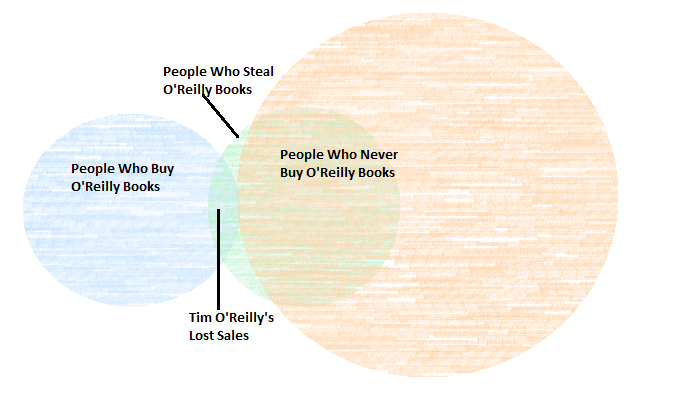A lost sale is customer demand that can’t be filled. SOPA, and most discussions of digital piracy, treat every illegitimate download as a lost sale. I’m not pro-pirate, but that understanding of lost sales is a bad reading of the issue.
Tim O’Reilly nailed the problem in a recent Google+ post: The lack of clear evidence in economic harm due to electronic piracy. There’s plenty of emotional baggage evidence in the form of “he’s watching my show/reading my book/playing my game and never paid for it.” This is absolutely true, absolutely unfortunate, and absolutely indicative of bad action on the part of the pirate.
But illicit use doesn’t translate to lost sales. O’Reilly points out that his books are widely pirated. I’ve been an enthusiastic customer of O’Reilly for well over a decade, and his company produces great books. They are, almost always, the best technical resources on the topics they cover. With a highly technical audience, his customers and potential customers are also the most able to find a way to pirate his company’s material. I have to think that O’Reilly books are pirated at a higher rate than most.
But, he argues, if the pirates would never have bought a copy anyway, there’s no economic harm.
Most people in the world will never buy an O’Reilly book. They’d be better off if they did, but for lack of interest or lack of honesty, they won’t. 0% of those people count as lost sales, so 0% of their activity contributes to economic harm.
When we’re talking about electronic good, that little group in the middle are the ones who hurt O’Reilly’s (or any other producer’s) bottom line. The rest are wrong, annoying, and bad-actors. But they’re not taking anything from O’Reilly in any sense other than an emotional one.
I’m not condoning piracy, but O’Reilly is right that pro-SOPA politicians and media companies are asking the wrong question. They’re assessing the problem based on the size of the circle of crooks, not the subset of crooks who are doing more-than-emotional harm. That’s not a recipe for success.

